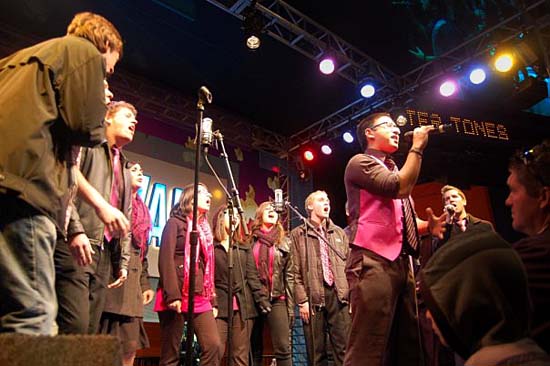From the first day that students step foot on UCLA’s campus, they become aware of the UCLA-USC rivalry. On Saturday, that rivalry will extend to a cappella. UCLA’s a cappella group the ScatterTones will compete at USC in the 15th annual International Championship of Collegiate A Cappella quarterfinals.
The International Championship of Collegiate A Cappella is an international competition that takes place every year from January to April. The competition divides the participating groups into seven divisions: New England, Northeast, Mid-Atlantic, South, Midwest, West and Western Europe.
Each region holds multiple quarterfinal events, and from each quarterfinal event, two groups go on to compete in the semifinal for that region. The winner of the semifinal event then moves on to the finals.
According to ScatterTones historian and social chair Melanie Fernandez, the competition setting brings out a different side of the ScatterTones.
“International Championship of Collegiate A Cappella is a competition we compete in every year. That means every year around this time, we have this “˜we have to place’ attitude. That means we have to have better rehearsals, a better mindset and must further emphasize personal accountability, which means that each member is responsible for spending a great deal of time practicing on their own,” Fernandez said.
While it would seem that the added stress would drive members apart, Fernandez said that it brings members together.
“We schedule a bunch of extra rehearsals, and our group gets a lot closer to each other. Each year when new members come in, we wonder how they’re going to handle this competition, a show where you’re performing in front of hundreds of people from the a cappella community, and in front of some of the harshest critics you can find,” Fernandez said.
Lauren Schlueter is one of those new members and is surprised by what the past couple weeks of rehearsals have done for her and the ScatterTones.
“We’ve become even more like a family because we spend so much time with each other. Especially since it’s through music, it seems to bond us on a different level,” Schlueter said.
As much as the veterans try to prepare the newcomers, nerves still get to first-year performers.
“My group members have given me a pretty good idea of what the competition is going to be like and have done a really good job of preparing us both mentally and vocally,” Schlueter said. “But I’m still nervous because I haven’t experienced it firsthand yet.”
For Fernandez, past International Championships of Collegiate A Cappella provide a driving force for her hard work.
“I watched the competition at USC two years ago,” Fernandez said. “That year, one of USC’s groups, the So-Cal Vo-Cals, won, and for their encore they sang a song that included the lines “˜U-C-L-A Sucks!'”
Not all members have the same anxious, competitive attitude toward the competition.
“I’m looking forward to having fun. It feels weird competing with music. Regardless of how we do, what’s important is that we put on a good show. The competition is more like a big concert than anything else,” ScatterTones President and Daily Bruin staff member Kendall Salter said.
Others, like second-year history student and ScatterTones business manager Matthew Flesock, acknowledged the rivalry between USC and UCLA but said they put it aside for the sake of the performance.
“At the end of the day, this competition is about music and not the traditional UCLA-USC rivalry. Other groups from all over the West Coast will be competing, so to have the rivalry bleed through would be unfair to all the other groups, USC groups included,” Flesock said.
Even though the ScatterTones have been preparing for this competition with all their heart, judging is out of their control. The only part they can remotely influence is the audience reaction portion.
“Certain groups will play toward the audience,” Salter said. “We don’t like to change our identity for the competition. We don’t want to sacrifice the type of music we sing for a competition.”
The ScatterTones do, however, put more into their performances for both the judges and audience.
“We always aim to do the best we can, but with this competition, you have to put forth your best performance. Unique to the International Championship of Collegiate A Cappella is the need for choreography, so learning that takes even more time. Where a regular recreational-type performance would take one or two rehearsals to prepare for, we have spent three months preparing for this competition,” Flesock said.
While performing on rival territory may be scary, seasoned performers like Fernandez aren’t worried.
“People get really caught up in the stress of preparing for a competition,” Fernandez said. “This is about fun, and we all want to have fun. We’ve been working really hard, and in working hard, we will get better. At its core, the International Championship of Collegiate A Cappella is just another venue for us to perform at and do what we love, which is singing.”
